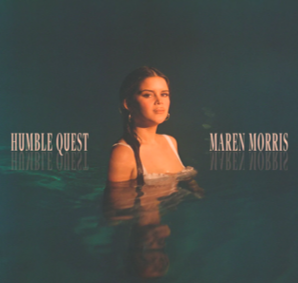Morris's “Humble Quest” Is A Beautiful Ode to The Road.
Many people spend their whole lives chasing. Whether it be after people, achievements or destinations, the grass is always greener somewhere out of reach.
In her latest album “Humble Quest,” Maren Morris exposes the irony in living each day with the anticipation of tomorrow that follows. Within the stellar lineup of songs, she writes an ode to the road about how true beauty is often found in the journey, not the destination. The album makes you think about finding meaning and beauty in obscure places. The best smelling flowers may not be roses at the florist, but wildflowers pushing their way through the grass. Beauty may not be the canyon you set out to see, but rather the places that you make unexpected pitstops in on the way there.
Morris' album is a sort of Buddhist lesson that preaches the importance of forgetting the nexts in life and really taking time to focus and relish on the now. It exposes the irony of living your todays for tomorrows as well as the often unexpected nature of life’s most important moments.
In “Humble Quest,” Maren Morris tells stories from her life to hammer home this message. The album kicks off with one of its most popular tracks, “Circles Around This Town,” which shares Morris' experience moving to Nashville and trying to make it in the country music city.
In the music video, you can see this narrative come to life. Even though the singer did indeed make it in Nashville, the moral of the song is that this confusing and beautiful journey doesn’t end when you hit a goal. You are always “driving in circles,” enjoying the scenery and trying to figure out what it all means.
In addition to this coming-of-age song, Maren keeps her musical motif steadfast throughout the album. While she weaves love songs and even a laugh or two in between the larger story, a lot of songs continue to hammer in the theme of the journey. While this track tells stories, it also has an awesome, windows-down sound that adds to the power of the piece. The slow and cyclical beat allows for a focus on the lyrics and changes in tone that encompass little flairs of emotion and comedic moments from Morris' journey. There is even a circular feel in her vocals, as she wavers words like “town” to perfectly replicate the feeling of sonic spin.
The song that best demonstrates the utter and untouched beauty of Morris' voice is “Hummingbird.” It echoes the stripped-down, slower style of Miranda Lambert’s “Bluebird,” but “Hummingbird” is even more raw, with nothing more than a slow acoustic guitar backdrop that is equal parts haunting and beautiful.
The song carries even more meaning after Maren revealed that she wrote the poetic lyrics on the day she found out she was pregnant. It documents the layered and wonderful road of motherhood, exploring how a child is simultaneously an extension of their parents’ past experiences and a free soul of their own. Morris taps into the beauty of wandering through this new phase of her life using her voice, playing with wordless vocal runs, “ooohs,” and “ahhhs” that somehow manage to tell a story using only those sounds.
“Hummingbird” is permanently engraved on Maren’s body as she has a small, water-color style hummingbird tattoo on her forearm. Even before she wrote “Hummingbird,” the creature held significance to her because one of her first and favorite guitars was a Gibson Hummingbird.
Meanwhile, on the other side of the style spectrum, is the song “Nervous.” It is by far the biggest outlier on the album because it brings an intensity and tempo that isn’t present in the other songs. The song, simply put, rocks harder than the other songs. It has whispers of Haim, Miley and Joan Jett. The sound and title align, as the song opens with an anxiety-provoking finger picking of the guitar.
In addition, Maren starts off slowly with lyrics, adding to the haunting sound. As the song builds, anxiety turns to adrenaline. Morris unleashes her inner rocker chick and screams out amidst awesome guitar riffs and strong drum beats complete with cymbal end-caps, releasing all the pent up emotion and anxiety that the person at the center of the song causes her. This song is killer. It’s impossible not to imagine Maren, wearing rockstar leather, on a smoky stage as she builds into rocking back and forth on her toes and shakes out her hair.
As present in “Nervous,” one of Morris's greatest assets is that she has the ability to inhabit the roads that connect different music “types.” And while there’s something utterly awesome about wholeheartedly committing to a specific sound or genre, there’s also something equally awesome about Maren writing her own guidelines to a self-created sound that doesn’t fit into pre-existing buckets. While she falls into the country category, Morris creates music that strings together R&B, pop, alternative rock and country into some sort of strong, refreshing, and hodgepodge Long Island Iced Tea. There’s flavors of Dolly Parton, Norah Jones, Miley Cyrus and—at times—even Billie Eilish.
As a result, the album “Humble Quest” has a sound that anyone could like—even “ABC” people. For those of you that aren’t familiar with this lingo, ABC means “anything but country”—a term that is all too frequently used as a cop-out response to the question, “What kind of music do you like?” The result is the light-beer version of country music that is easy to consume. Alongside others, such as Taylor Swift and Kacey Musgraves, Morris makes music that can serve as a “gateway drug” to the boot-scootin’ genre.
One gateway track that is pleasant on the ears is “Background Music.” The song is a beautiful tribute to human mortality and the importance of enjoying all of life’s phases, savoring simplicity, being compassionate with ourselves, and doing our best to leave people with happiness because our time on Earth is fast and fleeting. Regardless of if our lasting impact on people is just a passing smile or a lifelong relationship, it all matters. While death sounds harsh, Morris terms the end of our time on Earth as becoming background music. This is a beautiful metaphor for the unknown and the hope of another life. The harmonies, impressive vocal range and runs and slow fingerpicking of the guitar create a dramatic, cinematic feel that is worthy of the song’s existential topic.
In another existential track entitled “What Would This World Do,” Morris paints an intense emotion that everyone faces at one point or another in their life: the fear and pain of losing a loved one. In an interview, she said that the song was a heartfelt goodbye to her producer and longtime friend. For this reason, she wanted it to end the album because it would be a beautiful tribute to him and help bookend that loss. The sound matches the gravity of the topic, with beautifully rich and somber harmonies that bleed real emotion from those singing them. To make the song even more powerful, the track features Maren’s husband Ryan Hurd, who was also grieving the loss of the couple’s close friend. Hurd works in the industry songwriting and making music of his own. In fact, Hurd co-wrote over half of the tracks on “Humble Quest” with his wife and is featured on guitar and back-up vocals on several songs as well.
Occupying a happy, lighter note is one of the best tracks on the album, “Detour.” In this song, Maren draws on the beauty within life’s unexpected turns. This genuinely happy piece builds up to a climactic end as the steady drum pattern in the background escalates and intensifies as though it’s painting Morris as she marches through the journey she is singing about.
The drum pattern serves as a roadmap for the song and increases the emotion it conveys. Morris' vocals follow the power of the beat and the two culminate in a progression of sound that is awe-provoking, toe-tapping and powerful.
Following suit is the album’s title track “Humble Quest,” which also carries the same intensity within the constant and consistent drum-heartbeat that pumps power into the song. The lyrics of the song acknowledge the fact that Maren certainly doesn’t have it all figured out, and she’s just trying to make her way through life and find herself like the rest of us. In these songs, as with “Circles Around This Town,” Maren again emphasizes that destinations aren’t what create happiness in life, and that real happiness is achieved in little moments on the road between those destinations.
Maybe that is why this album is also a subtle ode to Hurd and Morris's own love. Songs like “The Furthest Thing” hit on the unique struggles of their sometimes long distance love while on tour. Within the wordplay of the timeless track “I Can’t Love You Anymore” and the campy humor and small jokes within “Tall Guys,” the couple’s fun-loving personalities shine. All these cute love songs have sounds that match their lyrics. All three sound like molasses and lemonade on a sunny day—simple, light and pleasant. They’re head-swaying, soft-smiling and comfort-provoking tunes that just make you want to snap your fingers. While Hurd and Morris' love story is obvious in some of the songs, there are elements of their love somewhere within the lyrics of nearly every song on the record.
But romantic love isn’t the only relationship celebrated in “Humble Quest.” The song “Good Friends” is the most popular on the album—and for good reason. The song is simple, heartwarming and beautiful. It celebrates the steadfast love, timelessness and consistency present in forever-friendship. The wonderfully strung out harmonies bring in elements of connection and the assonance of the rhyme scheme creates a pleasant and catchy sonic ambiance.
As this article reaches the end of its own narrative, it’s impossible not to admire how Morris uses “Humble Quest” to tell the story of the human experience —and the love, loss, struggle, confusion and bliss within it—with authenticity and honesty. The album is a hopeful reminder to stop and smell the flowers instead of getting too caught up in chasing the allure of the destination. Maren weaves creative snapshots of her life into her beautiful, intentional and layered musical catalogue—all while making sure that her songs are applicable to anyone who is trying to navigate this odd thing we call life.
While this album sounds like feel-good music that you find yourself singing along to while cooking dinner on a Monday night, there is a very well executed musical chapter book hidden within it—and we encourage you to add it to your reading list.












